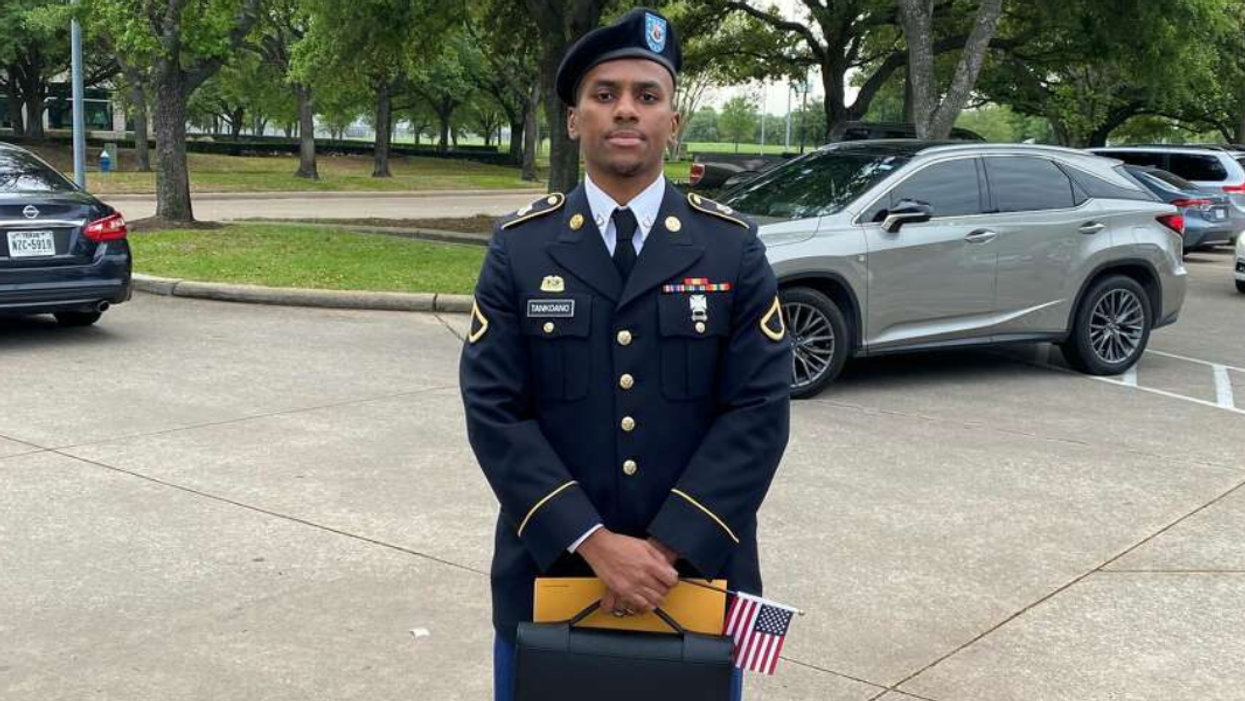Tankoano lives in Houston Texas after serving three years in the Army for 2018 to 2021. He applied for a new passport in 2019 only to be told he wasn’t a U.S. citizen.
I am a New York-born soldier now living in Houston, Texas, who was recently sworn in as a citizen after a years-long legal battle with the U.S. government over my citizenship.
There is a little known problem of statelessness in America and my recently resolved case highlights the flaws in the current system and the urgent need for change. November is National Veterans and Military Families Month and is the perfect time for us to reflect on the need to fix this problem. I was issued a U.S. passport at birth and served in the U.S. Army, risking my life for this country. I had always believed myself to be an American citizen. However, when I applied for a new passport in 2019, I was told much to my surprise that I wasn't a citizen after all and was at risk of being deported to Africa. I was shocked and found this hard to believe.
The State Department argued that since my father was a diplomat from Niger with immunity, I was exempt from U.S. laws that grant birthright citizenship to those born on U.S. soil, even though I was born in Manhattan. They claimed their earlier decision to issue me an American passport had been a mistake.
What followed was a three-year legal battle that left me in a state of legal limbo. I was considered “stateless” because I had renounced my citizenship of Niger and thus I was a “citizen of nowhere.”
I was given a notice to appear in court as part of a deportation process. The reason cited for the rejection of my citizenship application was that I lacked "good moral character," based on my rejected passport application. As someone who had served in the military and passed multiple background checks, this was particularly upsetting. Imagine finding out that your government thinks you lack good moral character, even though you served in the military overseas. It’s an organization in which I embodied the deep moral values of honesty and integrity.
The government's treatment of my case and the many other veterans who have faced deportation or statelessness due to technicalities or bureaucracy is unacceptable. These issues undermine the sacrifices and contributions of those who have served honorably and put themselves in harm's way for this country. This also goes against American values and the principles of justice and fairness that we serve to uphold.
This November is a good time for us to consider addressing this issue, and to ensure that all veterans, especially those who have served in combat, receive the benefits we deserve. It is a time to honor those who have served and sacrificed for their country.
I commend the efforts of the White House to address the deportation of veterans and the Department of Veterans Affairs for providing information to non-citizen veterans on how to become citizens. However, more needs to be done to fix the broken system that allows statelessness to continue.
There are an estimated 218,000 stateless people in America. We all have our own stories, and as a veteran, I am just one formerly stateless person. I’ve recently met other stateless people through United Stateless, an organization seeking to fix this bureaucratic nightmare for all of us. Thanks to our advocacy, the U.S. Department for Homeland Security recently issued new guidance on statelessness. The new guidance will help by allowing immigration officers the ability to consider statelessness as a discretionary factor in their decisions. But the changes are only temporary, and we need to enshrine them into law through the legislative process. To do that, we need to pass the Stateless Protection Act.
Statelessness is a pressing issue in the United States. Stateless people are denied access to education, job opportunities, healthcare, and the freedom to travel, perpetuating their vulnerability and hardship. We must raise awareness, promote legislative solutions, and empower stateless individuals to access legal status and the protection they deserve on American soil.
We need a system that recognizes the contributions of all individuals who serve in the military, regardless of their parentage or immigration status. We also need to legally enshrine clear and fair procedures for verifying citizenship and addressing cases of statelessness.
As we mark National Veterans and Military Families Month, let’s remember the sacrifices and bravery of those who have served, and commit to fixing the bureaucratic limbo of statelessness. Let us ensure that no veteran is left in a state of legal limbo or forced to fight for their own citizenship. Let us honor their service by providing them with the rights and protections they have earned. I urge all Americans to support efforts to fix the broken system. It's high time we honor our commitment to our veterans in the most meaningful way possible.


















 Senate Committee on Commerce, Science, and Transportation ranking member Sen. Maria Cantwell (D-WA) (R) questions witnesses during a hearing in the Russell Senate Office Building on Capitol Hill on February 10, 2026 in Washington, DC. The hearing explored the proposed $3.5 billion acquisition of Tegna Inc. by Nexstar Media Group, which would create the largest regional TV station operator in the United States. (Photo by Chip Somodevilla/Getty Images)
Senate Committee on Commerce, Science, and Transportation ranking member Sen. Maria Cantwell (D-WA) (R) questions witnesses during a hearing in the Russell Senate Office Building on Capitol Hill on February 10, 2026 in Washington, DC. The hearing explored the proposed $3.5 billion acquisition of Tegna Inc. by Nexstar Media Group, which would create the largest regional TV station operator in the United States. (Photo by Chip Somodevilla/Getty Images)
